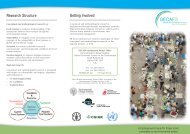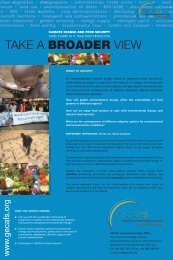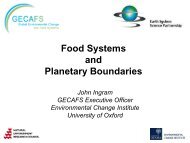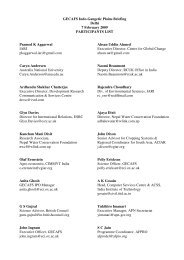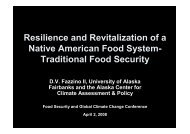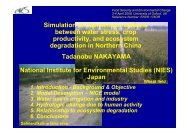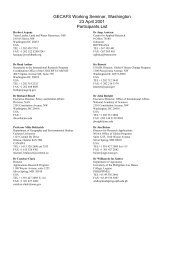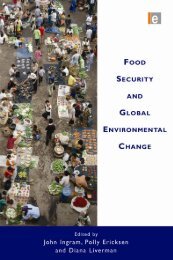From Food Production to Food Security - Global Environmental ...
From Food Production to Food Security - Global Environmental ...
From Food Production to Food Security - Global Environmental ...
- No tags were found...
You also want an ePaper? Increase the reach of your titles
YUMPU automatically turns print PDFs into web optimized ePapers that Google loves.
GEC and the <strong>Food</strong> System of the Indo-Gangetic Plain: An Example GECAFS ResearchProjectOne of the initial regional GECAFS research projects concerns the food system of the Indo-Gangetic Plain (IGP). This is largely dependent on rice and wheat grown in rotation and thereis growing concern that the productivity of the system is declining, especially the ricecomponent: an assessment of 11 long-term rice-wheat experiments (ranging from 7 <strong>to</strong> 25years in duration) from the region indicates a marked yield decline of up <strong>to</strong> 500 kg/ha/yr inrice in nine of the experiments (Duxbury et al., 2000). Continuation of these trends will haveserious implications for food provision, local livelihoods and the regional economy. As agiven season’s weather is a major determinant of yield (due <strong>to</strong> both the direct effects on cropgrowth and indirect effects related <strong>to</strong> management), there is concern that changes in climate,especially related <strong>to</strong> changes in climate variability, will exacerbate the observed trend.Moreover, other analyses (e.g. Grace et al., 2001) show that the highly-intensive productionapproach currently practiced in large parts of the region is a major source of greenhousegases, while the current irrigation practice is having serious negative effects on local watertables and water quality.As the IGP food system is both threatened by global change and contributes <strong>to</strong> further globalchange “forcing”, research is needed <strong>to</strong> help develop policy and agronomic strategies <strong>to</strong> (i)sustain production, especially in the face of potential increased climate variability anddegradation of land and water resources; and (ii) promote production systems which enhanceenvironmental and socioeconomic conditions. Due however <strong>to</strong> the marked socioeconomicand biophysical differences across the region, a single approach is not appropriate. Aconsultation process with local and regional policy makers determined information needs inrelation <strong>to</strong> GEC for regional policy formulation, and gave rise <strong>to</strong> a number of possibleresearch issues.The eastern region of the IGP is a food deficit region characterised by low productivity, lowinputs of fertilizer and water, risk of flooding, poor infrastructure and an out-migration oflabour. Interdisciplinary research will be developed <strong>to</strong> address questions such as:Theme 1: How will climate variability affect vulnerability <strong>to</strong> flooding within the region?Theme 2: What are the market opportunities and management options for diversifying crops(e.g. aquaculture) <strong>to</strong> make more effective use of flood and groundwater?Theme 3: How will these strategies effect labour migration, the interregional movement offood grains and water quality and river flow?In contrast, the western region is a food surplus region characterised by higher investment,high productivity, major use of fertilisers and ground-water for irrigation, and an in-migrationof labour. Interdisciplinary research will be developed <strong>to</strong> address questions such as:22



